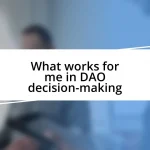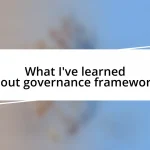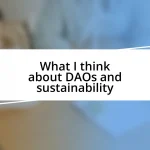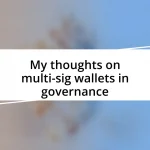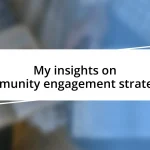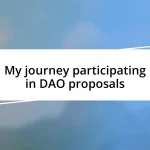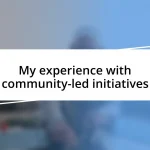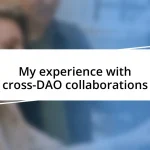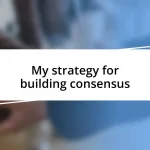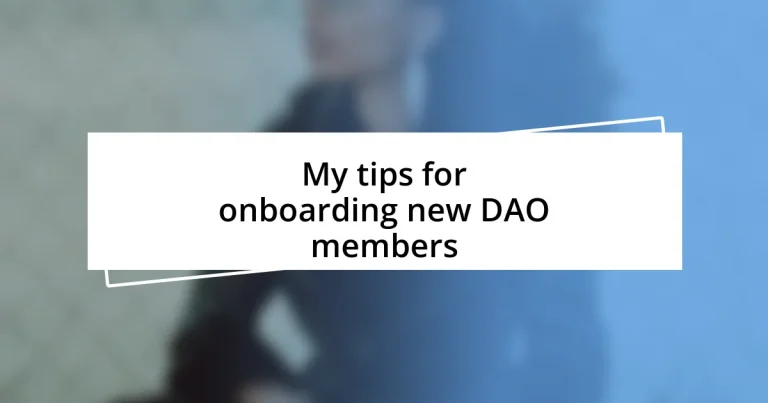Key takeaways:
- DAOs empower members through community governance, utilizing blockchain for transparency and smart contracts for trust in decision-making.
- Effective onboarding processes and community engagement foster a sense of belonging, resilience, and enhance decision-making within a DAO.
- Continuous learning and the incorporation of feedback create a culture of growth, allowing members to adapt and contribute meaningfully to the DAO’s mission.
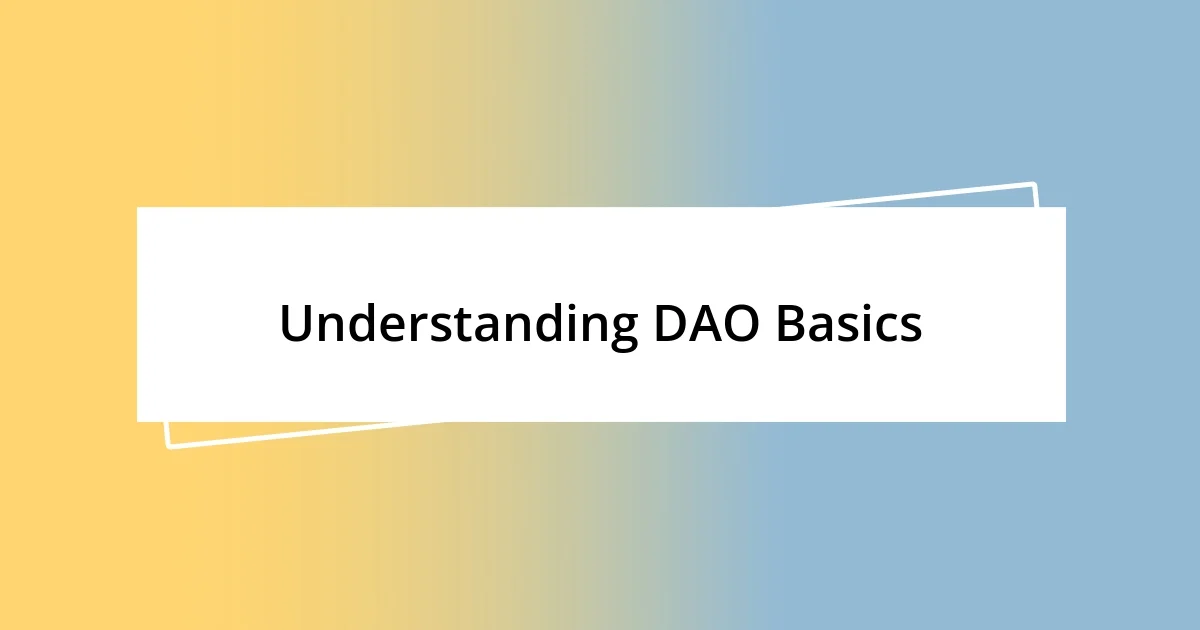
Understanding DAO Basics
A Decentralized Autonomous Organization (DAO) fundamentally shifts how traditional organizations operate. For me, the first time I encountered a DAO, it felt like stepping into a new world where community governance took center stage. Isn’t it eye-opening to think about how members can collectively make decisions without a central authority?
At its core, a DAO operates on blockchain technology, ensuring transparency and security in every action taken. Reflecting on my experience, I remember participating in a voting process within a DAO; the exhilaration of knowing that my voice mattered in steering the direction of the project was incredible. How empowering is it to realize that you’re part of something bigger, where your opinions can shape the future?
Understanding the basics of a DAO also means grasping how smart contracts function. These digital contracts automatically execute actions when specific conditions are met, leaving no room for ambiguity. I often think back to a time when a project I was involved in successfully utilized smart contracts to manage contributions. The seamless execution gave me a profound sense of trust. Don’t you agree that feeling secure in a platform’s operation creates a better experience overall?
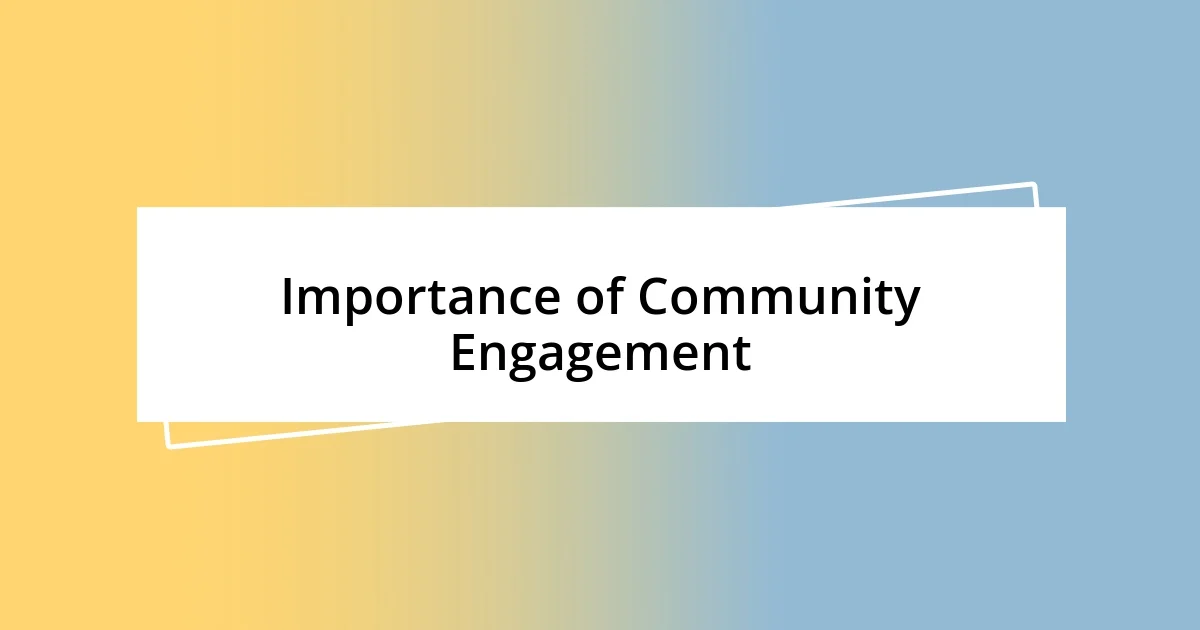
Importance of Community Engagement
Community engagement is the heartbeat of a DAO. When members actively participate, it fosters a sense of belonging and ownership. I remember when I joined a new DAO and took part in my first community forum; hearing diverse perspectives inspired me. It made me feel connected to people from various backgrounds, all united by a common vision. Isn’t it fascinating how these interactions enrich our experiences?
Moreover, engaged communities are often more resilient. They can weather challenges through collaboration and mutual support. I’ve seen this firsthand when a DAO I was part of faced a major decision. Instead of splintering, members came together to brainstorm solutions, showcasing the power of collective wisdom. It’s moments like these that highlight the importance of galvanizing members to communicate openly and frequently.
Lastly, community engagement directly impacts the success of a DAO. A vibrant and active community drives better decision-making and innovation. Reflecting on my own experience, I recall a project that initially struggled until they emphasized onboarding and engaging their members. Within weeks, participation surged, and ideas flowed. Doesn’t it make you wonder how much untapped potential lies in fostering a strong community connection?
| Benefits of Community Engagement | Examples |
|---|---|
| Sense of belonging | Members feel valued and connected |
| Resilience | Collaboration through challenges |
| Enhanced decision-making | More diverse and innovative solutions |
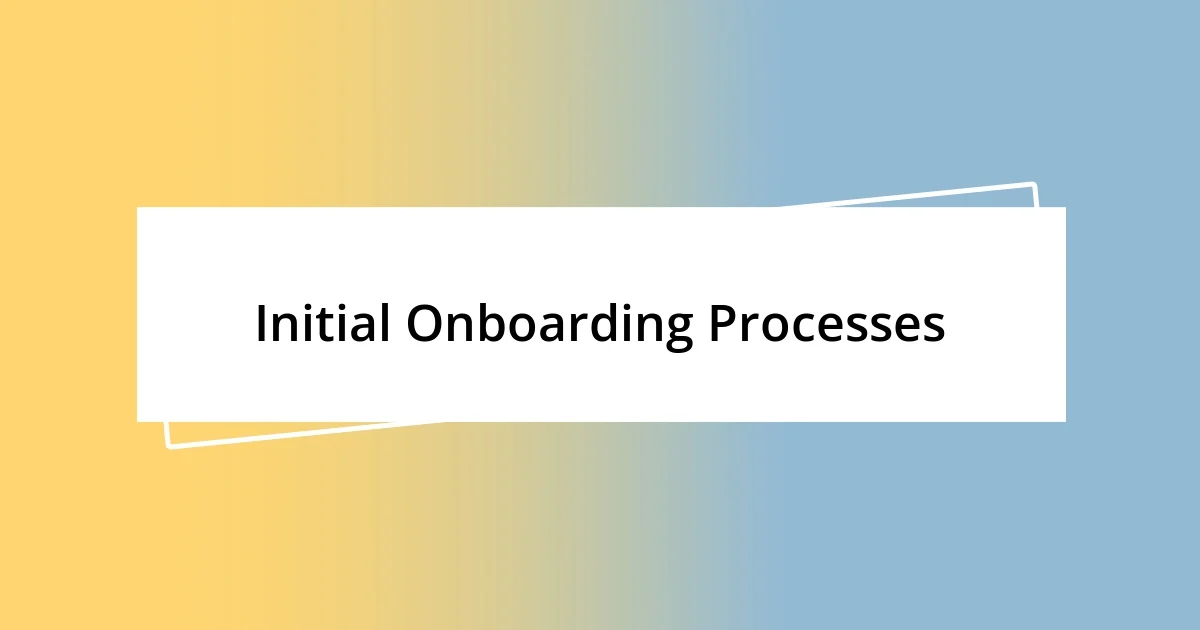
Initial Onboarding Processes
Initial onboarding processes are crucial for setting the right tone for new members. When I first joined a DAO, the welcome packet I received made a significant difference. It was like being handed a roadmap in a new city. A well-structured onboarding process should not only introduce new members to essential tools and platforms but also align them with the DAO’s mission and culture.
Here are some key components that should be part of the initial onboarding process:
- Welcome Kit: A comprehensive guide that includes FAQs, key contacts, and community norms.
- Introductory Meetings: Schedule one-on-one or group sessions to allow new members to ask questions and meet existing members.
- Mentorship Program: Pairing newcomers with experienced members can ease their transition and provide personalized guidance.
- Interactive Workshops: These can help familiarize new members with the DAO’s tools, workflows, and the decision-making process.
- Feedback Mechanism: Implementing a way for new members to share their onboarding experiences is crucial for continual improvement.
Implementing these strategies not only eases newcomers into the community but also fosters a sense of belonging and engagement right from the start. Remember my first workshop? It felt like an epiphany to learn directly from an experienced member. I realized then that everyone was genuinely invested in each other’s success, which is an essential aspect that builds trust.
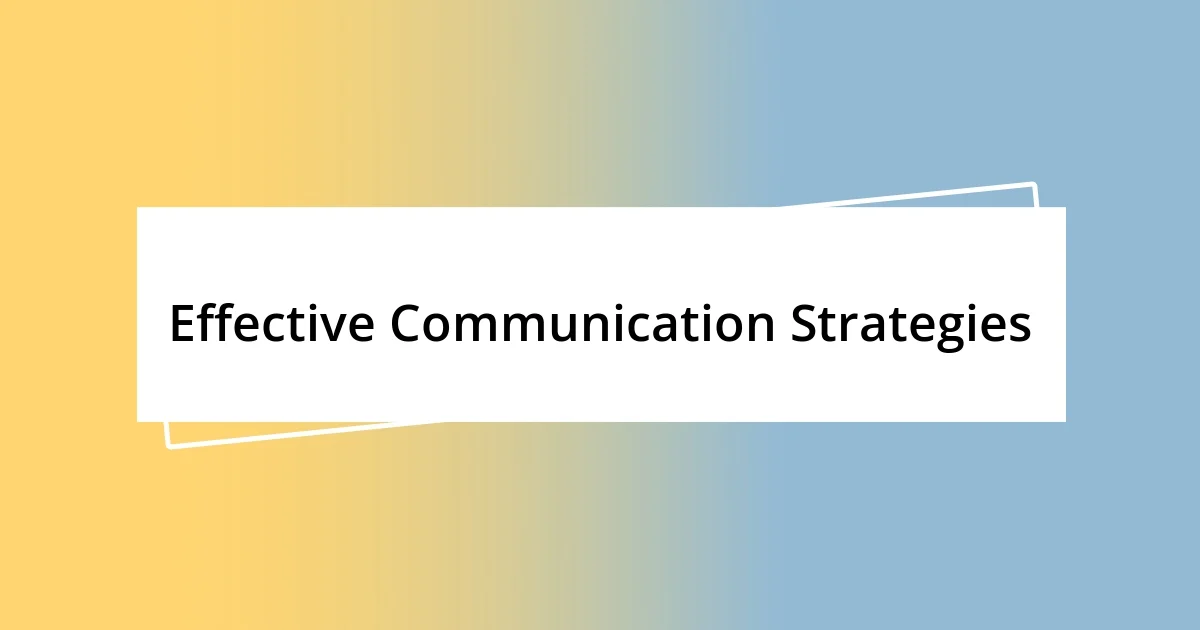
Effective Communication Strategies
Effective communication is essential in nurturing a thriving DAO community. When I started my journey in a DAO, I quickly learned that regular check-ins, whether through messages or video calls, can make all the difference. Have you ever noticed how simply asking, “How are you feeling about our current project?” can open a floodgate of ideas and concerns? It’s these small gestures that show members their voices truly matter.
Additionally, utilizing various communication channels is crucial. I fondly remember how a dedicated Discord channel for newcomers created a safe space for questions and dialogue. It not only eliminated the intimidation of asking “dumb” questions in public forums but also fostered camaraderie among new members. I still think back to those late-night chats where we bonded over shared uncertainties and aspirations, emphasizing the importance of tailored communication methods to cater to different comfort levels.
Lastly, I believe that transparency is the backbone of effective communication. In one DAO I was part of, the leaders shared weekly updates on ongoing discussions and decisions. This practice not only kept everyone informed but also encouraged participation in a meaningful way. Reflecting on that, it makes me wonder—how can we ensure our communication practices remain inclusive and engaging for each unique member? Balancing openness with an inviting atmosphere can truly empower a community.
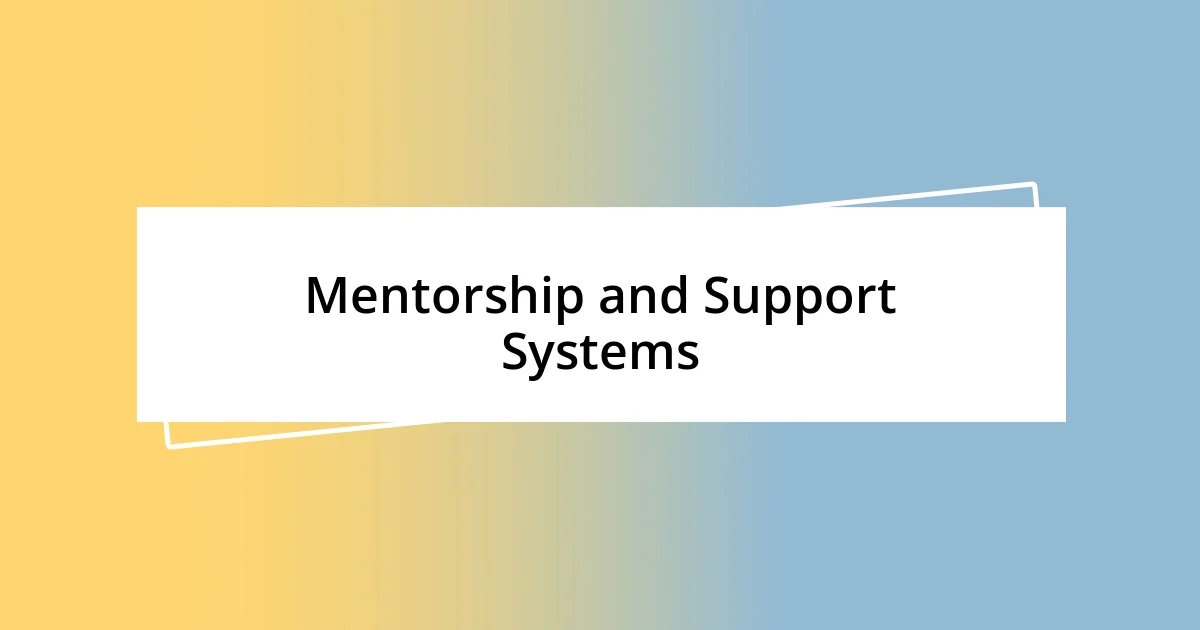
Mentorship and Support Systems
Mentorship is a game-changer in the onboarding process for new DAO members. When I first stepped into a DAO, my mentor made it easy to navigate the initial complexities. It felt like having a guiding star; someone to turn to whenever I faced any uncertainty. Pairing new members with seasoned veterans not only fosters confidence but also accelerates their integration into the community. I often think back to those moments when my mentor patiently explained the nuances of our governance process. Their insights helped me feel more competent and engaged.
Support systems are equally vital. I found that having regular check-ins with my mentor created a safe environment to voice concerns and share ideas. It was during one of those conversations that I realized how much I valued having someone who genuinely listened. This support not only helped me hone my contributions but also strengthened my connection to the DAO. Have you ever felt lost in a new environment? That feeling is familiar to many newcomers, and a solid support system can help ease those tensions.
Creating an ongoing mentorship culture can truly elevate a DAO’s onboarding experience. Encouraging experienced members to share their knowledge through informal sessions or Q&As can be immensely beneficial. I remember a casual lunch we had as a group where various members shared their unique stories and experiences. It was not only enlightening but also fostered deeper connections among us. Isn’t it fascinating how these little interactions can spark a sense of belonging and ignite passion for the collective purpose?
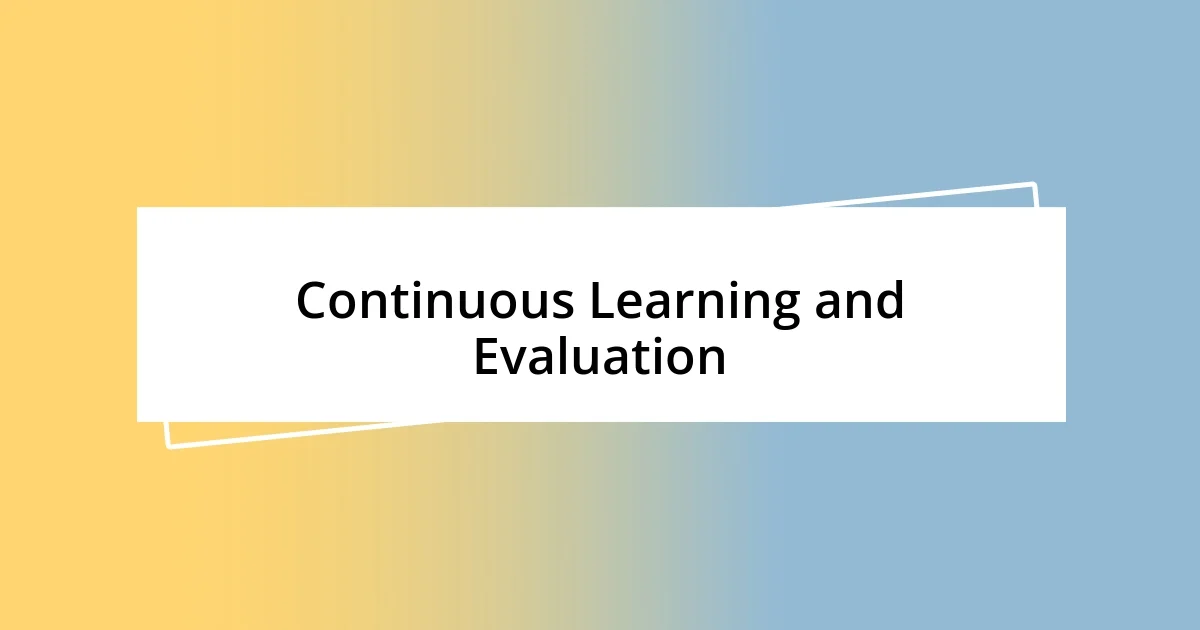
Continuous Learning and Evaluation
I’ve always believed that continuous learning is the lifeblood of any DAO, especially for new members. During my early days, I was surprised by how often I found myself revisiting lessons and feedback. For instance, after a swift failure in a group project, our team took a step back to evaluate what went wrong. This reflection wasn’t just about fixing errors; it transformed our approach and deepened our understanding of each member’s strengths. Isn’t it remarkable how mistakes can morph into powerful learning experiences if we allow ourselves to analyze them openly?
Evaluation shouldn’t be seen as a one-time event—it’s an ongoing dialogue. I find that creating feedback loops, where members regularly share their thoughts on processes and projects, not only empowers individuals but also cultivates a culture of growth. In one of my DAOs, we initiated monthly retrospectives that wasn’t merely a checklist; it was a collaborative discussion that sparked innovative ideas. How could such discussions impact the engagement level of new members? It’s often in these safe spaces of open dialogue that we find the courage to voice our ideas and enhance our contributions.
Moreover, I think establishing a mindset that values curiosity leads to richer experiences. I recall joining a workshop where every attendee was encouraged to ask at least one “why” or “how” question about our ongoing initiatives. The sheer diversity of inquiries opened new dimensions of understanding and collaboration, reminding me that learning doesn’t end with onboarding. Instead, it’s a continuous journey we embark on together, challenging ourselves along the way. Have you ever experienced that feeling of collective enlightenment? It’s invigorating, isn’t it?
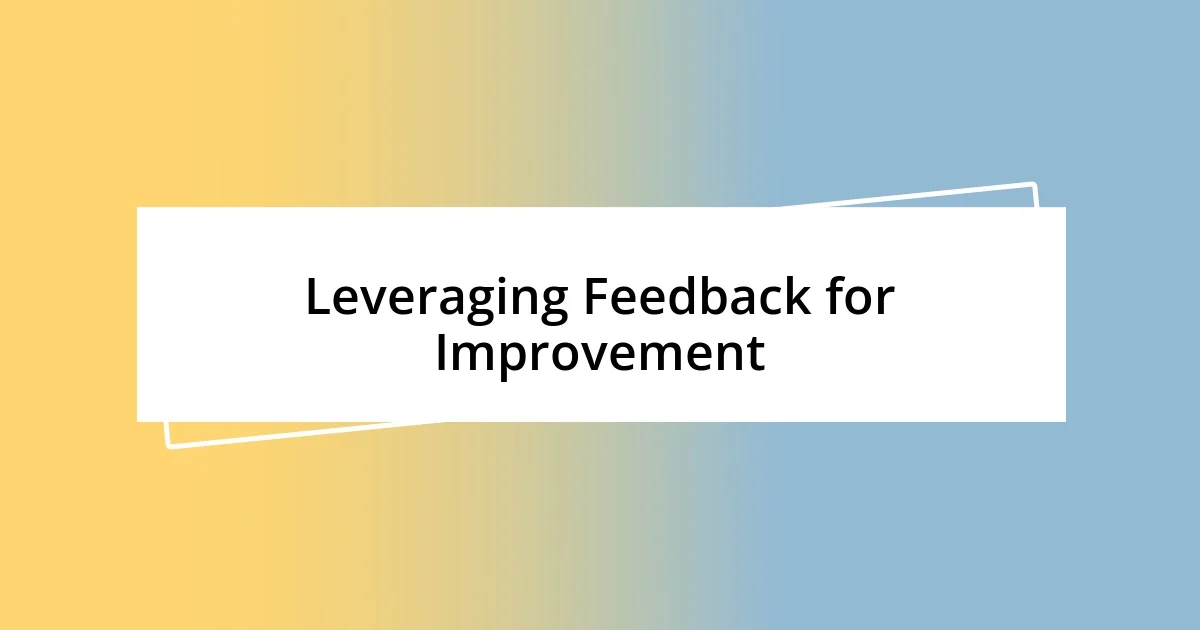
Leveraging Feedback for Improvement
Feedback is an invaluable tool for improvement, especially in a dynamic environment like a DAO. I remember when I first got constructive criticism on a proposal I had put forth. At first, it stung a little, but then I realized how it opened my eyes to perspectives I hadn’t considered. Have you ever felt that exhilarating rush when you turn a critique into a stepping stone for growth? Embracing feedback can transform your contributions and elevate the group as a whole.
In my experience, incorporating regular feedback sessions can create a culture where ideas evolve rather than stagnate. I once participated in a brainstorming meeting where we encouraged all members to express their thoughts without judgment. The vibrant discussion that ensued took our project in an unforeseen but exciting direction. It’s incredible how many great ideas can surface when everyone feels safe to speak up. How often do we really give ourselves permission to be open and honest in our discussions?
Moreover, I firmly believe that asking for feedback actively showcases a member’s commitment to the DAO’s mission. After my first project, I sought input not just from my mentor but from peers as well. This practice not only helped me build rapport but also demonstrated my willingness to learn and adapt. Have you considered how simple actions like this can lead to deeper connections within your DAO? Every bit of feedback, positive or negative, is an opportunity to grow. So let’s embrace these conversations and use them to unlock our collective potential!

